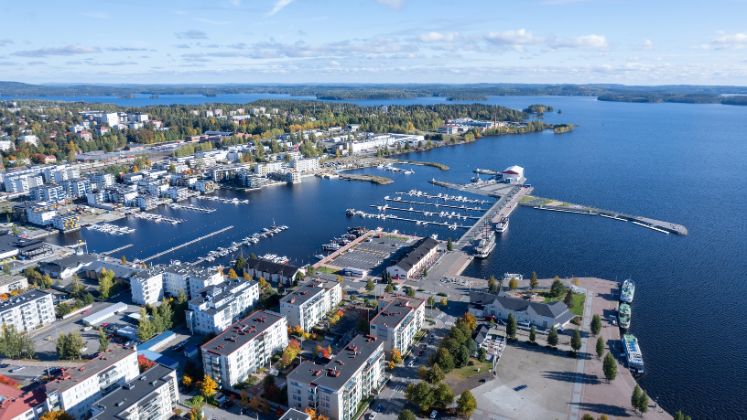In this bookshop guide, Roseanna Avento takes us on a tour of her favourite bookshops in the region of Lakeland Finland. If you know a city with great spots for book lovers, you can find information about how to contribute to our global bookshop guide series at the end of this article.
Fleur Adcock’s 2014 poem “The Bookshop” says: “We lost sight of each other and / they disappeared – or, as it seemed to them, / I disappeared.” Such is the situation Finland finds itself in: a country that’s losing its bookshops. The Finnish Booksellers’ Association estimates that almost 300 bookshops have vanished over the last 25 years. It’s a curious irony for a nation where over 20 million books are sold each year, with each Finn reading around 16 of them annually. Despite this trend, some gems remain standing strong. Let’s take a virtual journey to see what’s on offer.
Rosebud Bookshop, Kuopio
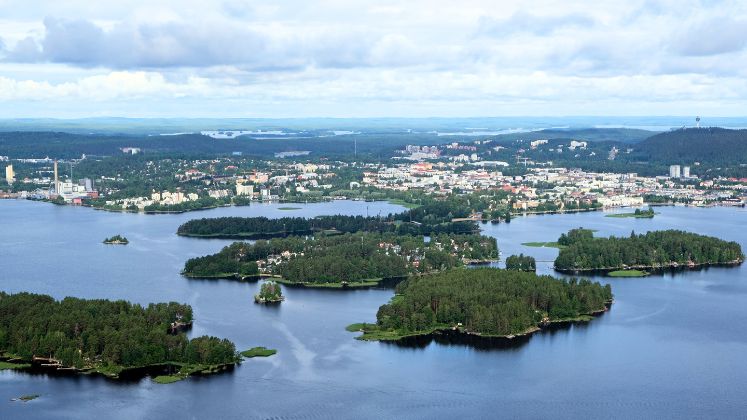 Rönö Island on Lake Kallavesi, Kuopio, Finland © kallerna via Wikimedia CC BY-SA 4.0
Rönö Island on Lake Kallavesi, Kuopio, Finland © kallerna via Wikimedia CC BY-SA 4.0
Kuopio, nestled in Finland’s Northern Savo province, is a major cultural and educational city with a population close to 130,000 and marks its 250 anniversary this year. Kuopio is surrounded by Lake Kallavesi and boasts one of the oldest Finnish forests, and one of the country’s first protected nature reserves, Puijo. Kuopio city, where nature and culture intertwine seamlessly, is home to a vibrant cultural and literary scene. One cannot mention Kuopio without talking about Minna Canth, one of Finland’s most celebrated literary figures. She was a playwright, novelist and social activist and the first woman to receive her own Finnish flag day (19 March), also deemed Equality Day, honouring her contribution to women’s rights and social justice. A short walk from her old home “Kanttila”, brings you to the Tori, the bustling marketplace and beating heart of any Finnish town, and just a stone’s through away, stands the Rosebud Bookshop. Its staff exemplify a true Savo sensibility: humour and down-to-earth diplomacy, where the onus of understanding is on the listener.
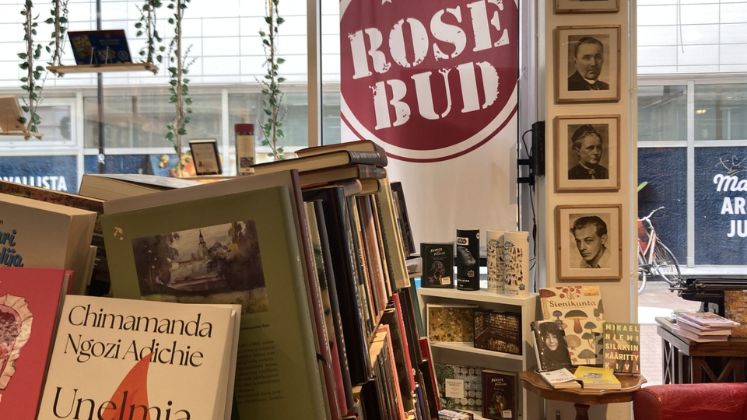 The interior of Rosebud © Roseanna Avento
The interior of Rosebud © Roseanna Avento
It’s a cosy joint, interestingly run by a cooperative whose seven members include both culture enthusiasts and seasoned professionals: library experts, photographers, visual artists, a designer and a translator. Rosebud’s slogan “Maailma ei ole valmis. Tarvitaan enemmän kirjoja” (The world is not ready. We need more books) demonstrates their strong commitment to serving readers. Kuopio’s Rosebud is a sister to five other Rosebuds in Helsinki and one in Oulu, and together they carry over 63,000 book titles and films on DVD – Finland’s largest selection. Rosebud is a haven for readers seeking unique literature. They carry works from independent and small publishing houses, as well as rare and unique publications in Finnish and Swedish, a decent English collection and a strong second-hand book section. They can order what they don’t have on shelf, too. Rosebud’s venues are vibrant cultural spaces, where people come together for author talks, exhibitions and literary events.
Muusan Kirjakauppa, Varkaus
An hour’s drive south of Kuopio lies Varkaus, a modest town, shaped by nearly three centuries of industrial development. Its growth centered around a paper mill established in the late 1800s by the A. Ahlström company, which evolved into one of Finland’s most prominent industrial powerhouses. Today, the mill is part of the company Stora Enso and has transformed its operations from paper production to producing renewable packaging material and packaging board. With its location close to the paper mill, Varkaus was a natural location for printing operations of newspapers. Paper reels from the paper mill were transported directly to the presses via a railway track connecting the paper mill and the printing plant. The printing plant is still operational, though modernised, and serves the media company Keskisuomalainen Oyj, which incidentally also owns 80 different newspapers including the newspaper Keskisuomalainen, which is the oldest Finnish language newspaper still in circulation.
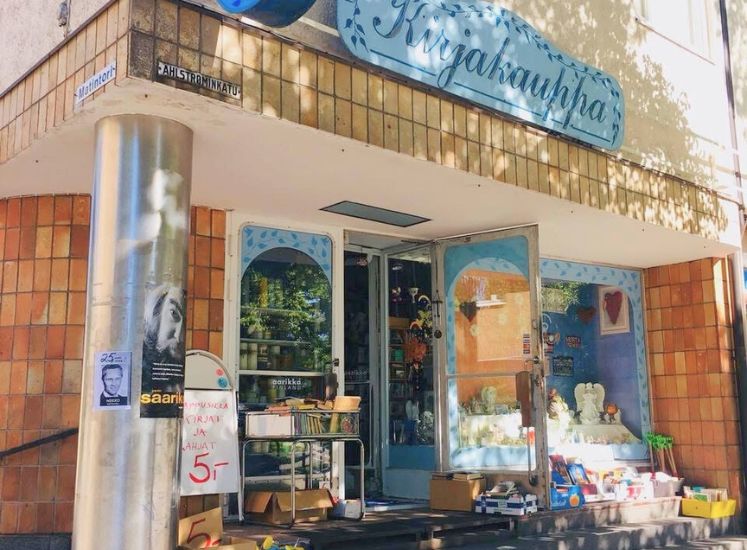 The entrance to Muusan Kirjakauppa © Muusan Kirjakauppa via Facebook/Meta
The entrance to Muusan Kirjakauppa © Muusan Kirjakauppa via Facebook/Meta
Not too far from the paper mill and printing plant, is Muusan Kirjakauppa (Muusa’s Bookshop), an independent store with a warm and distinctive charm that veers towards the magical. Amid the seemingly haphazard, narrow, teetering piles of old and new books (mostly Finnish titles) going from floor to ceiling, you’ll be sure to find an eclectic selection of trinkets, gift items and cards. The proprietor Eija Pöllänen is one of the friendliest and chattiest people you’ll meet, and she’ll find anything you are looking for in a jiffy. You can’t hurry in Muusa; the clocks forget to tick as you make your picks.
Vinha Bookshop, Ruovesi
About three hours’ drive west of Varkaus, you will find Ruovesi, a small and tranquil municipality, in the region called the “Heart of Finland”. Ruovesi is known for its rich wilderness, which provided inspiration to, among others, Finnish national poet Eino Leino and iconic artist Akseli Gallen-Kallela, who built his studio and home, Kalela, there. One of Ruovesi’s most famous attractions is Helvetinjärvi National Park (Hell’s Lake National Park). But before taking the hike in Hell, one must stop in Vinha Bookshop, Finland’s oldest at 122 years old.
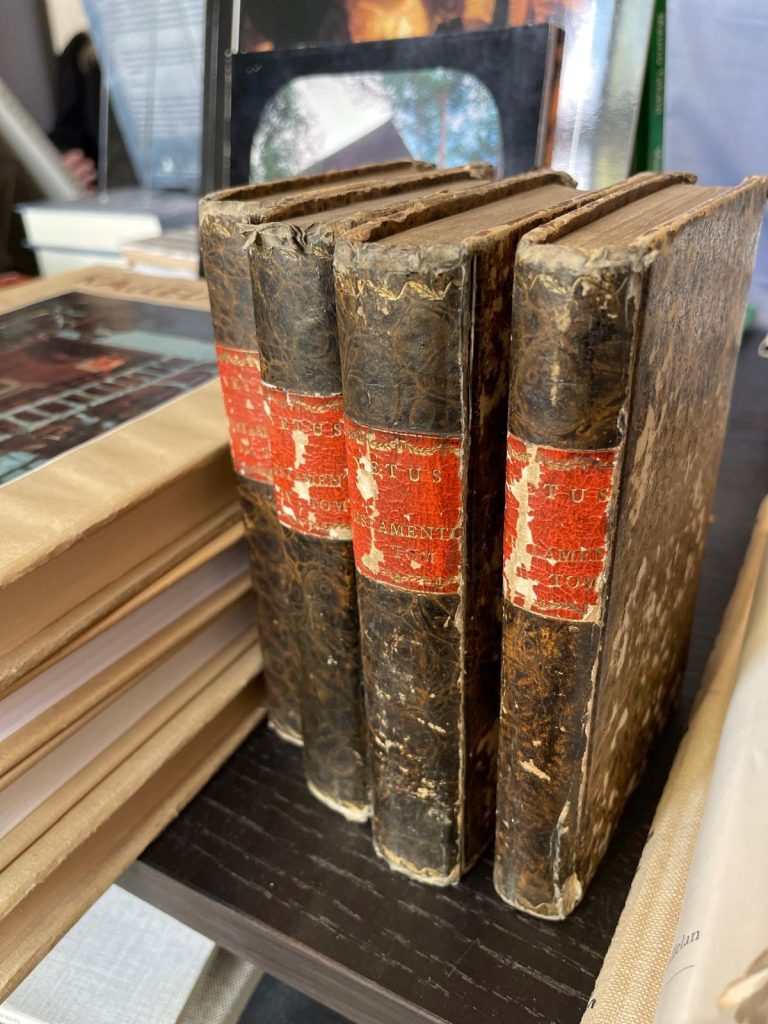 Some of Finland’s oldest books can be found at Vinha © Roseanna Avento
Some of Finland’s oldest books can be found at Vinha © Roseanna Avento
Going back to the 1800s in Ruovesi, we find a tailor Juuse Wilenius (1814-1896) who wrote deeds of sale and estate inventories, having gained the skill of writing from his knowledge of sewing and embroidery. Historically, tailors were often literate and respected members of society, and so was he. Wilenius was also a sexton, and managed the church collection box accounts. Juuse’s son Kustaa (1873-1962) became a bookbinder and founded the bookshop in 1903, which was run by four generations of his family before they sold it to Pasi Vainio and Mikko Vartiainen in 2023.
Vinha Bookshop is not just a tourist destination, but also a historical and cultural one, remaining in its original location built in 1931 (up until that point it operated from the Wilenius home). In addition to an antiquarian section, it has current literature, an art gallery, accommodation facilities and a café. It’s an amazing feeling seeing second-hand books standing on the original shelving. They have titles in mostly Finnish and Swedish but have English titles, too. They hold author and reading events, cultural activities and offer residency above the bookshop to writers, artists and other creative professionals. It doesn’t get better than this for a work environment! The café serves a croissant and home-made raspberry jam which is the most heavenly I’ve ever had! – paired with a good book in hand, of course!
Note: This bookshop guide gives the views of the author, and not the position of the LSE Review of Books blog, or of the London School of Economics and Political Science.
Main image credit: Michalakis Ppalis on Shutterstock.
Do you know a place with great bookshops? As part of a regular feature on LSE Review of Books, we’re asking academics and students to recommend their favourite bookshops in a particular city or town to share with our book-loving community of readers the world over.
Bookshops could be academic, alternative, multilingual, hobby-based, secret or underground institutions, second-hand outlets or connected to a university. We’d like to cover all world regions too and are particularly keen to feature cities outside of Europe and North America.
If something comes to mind, we’re looking for a brief introduction about the city, a selection of three or four bookshops with around 150 words per bookshop, detailing why each one is a must-see. Our editorial team can then find suitable photos and links to accompany the piece, though you’re welcome to supply these too.
Email us if you’d like to contribute: lsereviewofbooks@lse.ac.uk

